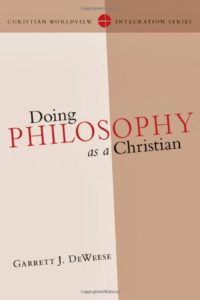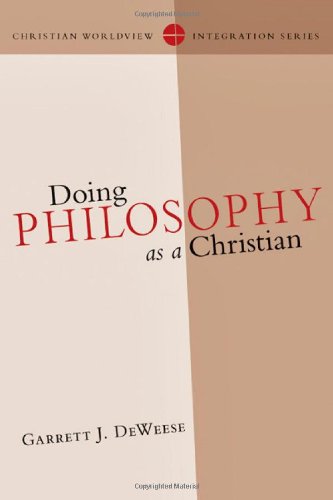 This week’s Book Review is on Doing Philosophy as a Christian (Christian Worldview Integration Series) by Garrett J. DeWeese (Downers Grove: IVP Academic, 2011), 352 pp.
This week’s Book Review is on Doing Philosophy as a Christian (Christian Worldview Integration Series) by Garrett J. DeWeese (Downers Grove: IVP Academic, 2011), 352 pp.
If you are a Christian academic, pastor, or scholar, and you have always felt intimidated or daunted by philosophy (or the prospect of learning philosophy), look no further. Garrett DeWeese had you in mind. This is not a history of philosophy (on which, see W. T. Jones’ History of Philosophy), but an overview of the various realms within philosophy. Anyone wishing to become acquainted with philosophy must become acquainted with at least the main areas of metaphysics (the nature of reality), epistemology (the nature of knowledge), and ethics. One could do this by surveying histories of philosophy to see how each branch developed diachronically, but one would be better served to get the philosophical categories in mind before trodding through Plato’s dialogues.
DeWeese introduces the reader to these various areas of philosophical thought and tries to explain where Christian philosophers can, should, or must land on various issues. The book breaks down into four parts. The first establishes his method, the second involves first-order questions (metaphysics, epistemology, ethics and aesthetics), the third part involves second-order questions (philosophy of mind and of science), and the fourth part discusses philosophy as a means of spiritual transformation for the Christian. DeWeese operates within the boundaries of “canonical theism,” which he defines as “the broad stream of orthodoxy traceable to the church fathers and the ecumenical councils and creeds” (36).
I probably would have omitted aesthetics from the “first-order” questions, and if the reader only wanted to get the main three categories of philosophy under his or her belt, simply reading the sections on metaphysics, epistemology, and ethics would suffice. However, his chapters on second- and third-order questions are perhaps more interesting than the first-order questions since they are less familiar to non-specialists. For example, there is some fascinating work going on in the philosophy of mind that DeWeese does well to summarize and weigh in on.
This book does well to lay before the reader various opinions within each field of thought. For example, within metaphysics there is realism and nominalism, among others, and DeWeese does well to present such options and their representative arguments. Of course one could not present the arguments without some reference to the history of philosophy, and he does well to place many of the arguments with their historical contexts. This context is important to understand because many arguments may seem brilliant at first, only to have been proven incorrect or self-refuting a generation later. The reader therefore gets a balanced perspective that is not solely based on arguments, but also shows how philosophical doctrines have unfolded through history.
One problem in the book is a familiar problem with interdisciplinary work. In attempting to determine what positions are distinctively Christian, DeWeese utilizes much Scripture, but some applications will seem contrived to students of biblical studies. For example, DeWeese uses Hebrews 2:17 (Jesus was “made like his brothers in every way”) as a proof text to argue against those who would allow anthropological dualism for Jesus while positing monism for all other humans (259). It is hardly likely that the author of Hebrews had philosophy in mind as he penned this verse. This should be taken softly, though, since the work inevitably required the use of Scripture, which can be difficult to integrate into complex philosophical debates with exegetical integrity.
As far as DeWeese’s conclusions on the first-order questions, he holds (in my opinion) correctly that metaphysical “realism fits best in a Christian worldview,” because “[n]owhere in the Bible is there a hint that the external world is unreal, that something like Berkeley’s subjective idealism, or Kant’s transcendental idealism, is correct” (129). But the author surprisingly opts for epistemological internalism in order not to divorce epistemic justification from rational decision making (170). He briefly mentions Plantinga’s externalist view of warrant, but mentions it only as an opposing option and leaves it at that. It is likely that metaphysical realism (especially a Christian realism) entails epistemological externalism, but even if not, DeWeese had much more work to do in order to dispense so quickly with Plantinga, a leading epistemologist in any circle. Nevertheless, DeWeese does follow through in letting his metaphysics determine his ethical theory, opting for virtue theory as the best Christian view, which is inherently objective rather than subjective. Whatever disagreements one may have with DeWeese, he is at least charitable and cautious throughout the book, continually hedging his conclusions (e.g., “I could be wrong” [260]).
The rest of DeWeese’s discussions are shorter and more elementary, but still benefit the reader by introducing the subject and choosing which option seems to be more coherent within a Christian worldview. He is able to be less dogmatic about some of the later chapters since they are secondary or tertiary issues, such as philosophy of science, on which someone holding a Christian worldview could take multiple legitimate positions. This work could be used well in a philosophy of religion class or general philosophy courses in seminaries and Bible colleges. I would also highly suggest it for anyone wishing to enter the field of philosophy or to get their bearings straight regarding the major divisions of philosophy and the basic positions available.

